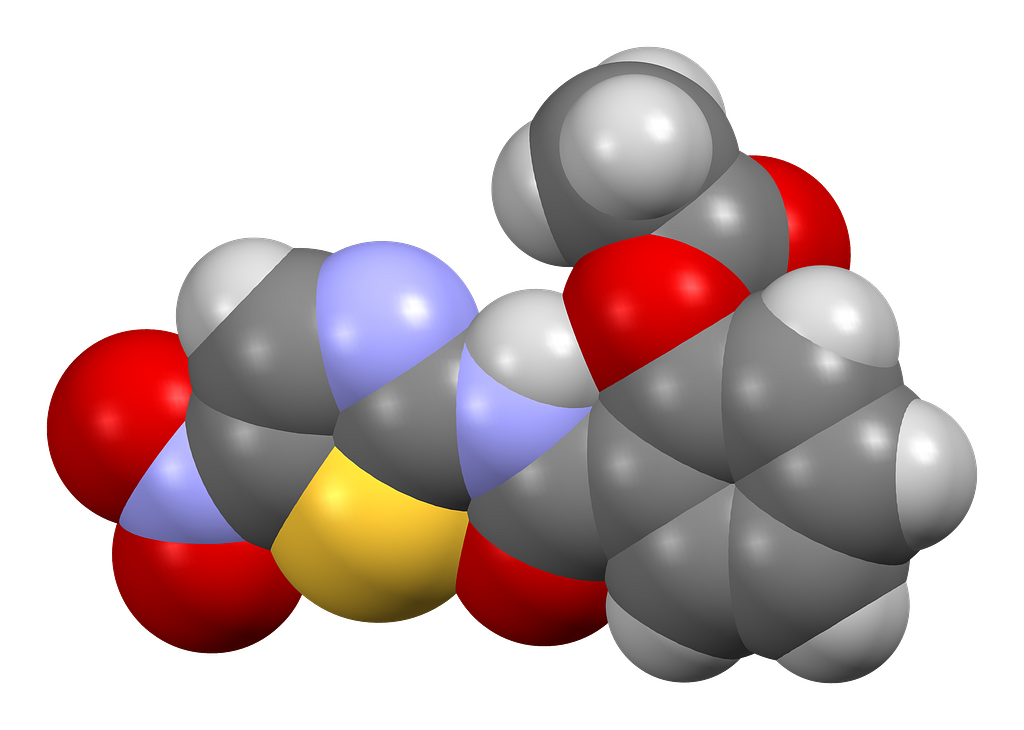Nitazoxanide
- I. Introduction
- II. Uses
- III. How it Works
- IV. Off-label Use
- V. Side Effects
- VI. Common Side Effects
- VII. Dosage and Administration
- VIII. Composition
- IX. Storage
- X. Interaction
- XI. Warning
- XII. Contraindication
- XIII. Careful Administration
- XIV. Important Precautions
- XV. Administration to the Elderly
- XVI. Administration to Pregnant Women and Nursing Mothers
- XVII. Administration to Children
- XVIII. Overdosage
- XIX. Handling Precautions
I. Introduction
Historical background and discovery of Nitazoxanide
During part of the 20th century, there was a significant advancement in antiprotozoal medications with the uncovering of Nitazoxanide. Developed from a nitro thiazolyl salicylamide, this extraordinary compound emerged as a powerful remedy for various parasitic infections.
Its place in modern medicine
Today Nitazoxanide has become a treatment for intestinal infections caused by Cryptosporidium parvum and Giardia lamblia. Its diverse applications have firmly established its role in medicine, often being preferred over traditional therapies for certain infections.
II. Uses
Primary indications for Nitazoxanide
Nitazoxanide is an antiprotozoal drug that can be used to treat various infections caused by protozoa, helminths, bacteria and viruses1. According to the FDA, nitazoxanide tablets are indicated for the treatment of diarrhea caused by Giardia lamblia or Cryptosporidium parvum in patients 12 years and older2. Nitazoxanide has also been shown to be effective against Helicobacter pylori infections, especially in combination with other antibiotics1.
Here are some references:
Nitazoxanide: Uses, Interactions, Mechanism of Action - DrugBank Online HIGHLIGHTS OF PRESCRIBING INFORMATION These highlights do not include … Nitazoxanide in the treatment of Helicobacter pylori infection: a double-blind …
Comparisons with other treatments in the same category
Nitazoxanide is an antiprotozoal medicine that treats infections caused by protozoa (single-cell parasites that live in moist places such as lakes, streams, and soil)1. It exhibits antiprotozoal activity by interfering with the pyruvate ferredoxin/flavodoxin oxidoreductase-dependent electron transfer reaction, an essential reaction needed for the anaerobic energy metabolism of various microorganisms2. It has a wide range of effectiveness and fewer side effects than similar medications available2. It also has the ability to combat drug-resistant strains2 effectively.
2: Nitazoxanide: Uses, Interactions, Mechanism of Action - DrugBank Online 1: Nitazoxanide Uses, Side Effects & Warnings - Drugs.com
III. How it Works
Mechanism of action
Nitazoxanide works by disrupting the electron transfer reaction of the pyruvate; oxidoreductase (PFOR) enzyme, which is crucial for anaerobic energy metabolism. Essentially this disrupts how the offending parasites produce energy.
Impact on the human body
Nitazoxanide is processed by the body and transformed into nitazoxanide, which is its active form. Tizoxanide then spreads throughout the body, specifically targeting organisms while leaving the body's natural microbiota relatively unaffected. Interestingly this selective mechanism ensures an impact on the host, thus highlighting its effectiveness in treating antiprotozoal infections.
IV. Off-label Use
Common off-label treatments using Nitazoxanide
Nitazoxanide is an antiviral drug with broad antiviral activity and may have the potential as an effective alternative or an addition to standard treatment for the treatment of the hepatitis C virus12. It is also being researched as a potential treatment for rotavirus gastroenteritis34, as its active metabolite nitazoxanide demonstrated efficacy against several RNA viruses in clinical trials4.
1: Nitazoxanide for chronic hepatitis C. - Abstract - Europe PMC 2: Nitazoxanide for chronic hepatitis C | Cochrane 3: Nitazoxanide - Wikipedia 4: Nitazoxanide drug found to be a potent inhibitor of several human coronaviruses
Scientific studies supporting off-label uses
Studies have explored the additional advantages of Nitazoxanide beyond its intended use. For example, a survey conducted in 2009 demonstrated its effectiveness in combating rotavirus due to its properties1. This suggests that it could be a tool for controlling the spread of the disease. Additionally, trials conducted on patients with hepatitis C revealed encouraging outcomes, particularly when used alongside antiviral medications23.
1: Nitazoxanide inhibits rotavirus replication in vitro and in vivo 2: Improved Virologic Response in Chronic Hepatitis C Genotype 4 Treated With Nitazoxanide, Peginterferon, and Ribavirin 3: Nitazoxanide for chronic hepatitis C | Cochrane
V. Side Effects
Overview of potential adverse reactions
Similar to medicinal compounds, Nitazoxanide is not without its potential side effects. These can vary from disruptions, in the gastrointestinal system to less common but more serious allergic reactions.
Factors influencing side effects
Several factors contribute to how individuals respond to Nitazoxanide. Age, medications, and preexisting health conditions all play essential roles. Additionally, the duration and dosage of the drug also have impacts; higher doses and prolonged use can increase the likelihood of experiencing adverse reactions.
VI. Common Side Effects
List of most frequently reported side effects
- Abdominal pain
- Diarrhea
- Nausea
- Vomiting
- Rash

Tips for managing and mitigating these effects
Patients can usually handle side effects by changing their diet or using remedies that don't require a prescription. Drinking plenty of water, eating simple foods, and using over-the-counter antidiarrheal medications recommended by a pharmacist could help alleviate the symptoms. If the side effects continue or worsen, seeking advice from a healthcare professional is crucial.
VII. Dosage and Administration
Standard dosing guidelines
For individuals 12 years old and above, the recommended dose is 500 mg to be taken orally every 12 hours along with a meal. The dosage for children depends on their weight. It is usually calculated as 7.5 mg per kilogram of body weight, administered every 12 hours.
Adjustments for specific populations or conditions
People who have liver or kidney issues may need to adjust their dosage. Similarly, if someone is taking medications that can affect liver enzymes, they might need a personalized dosing schedule. It's always important to seek advice from a healthcare professional for dosing recommendations.
VIII. Composition
Active ingredients and their proportions
Nitazoxanide tablets usually have 500 milligrams of the component. Furthermore, oral suspensions often consist of 100 milligrams per 5 milliliters of Nitazoxanide.

Excipients and other components
Additional components, like microcrystalline cellulose, maize starch, and magnesium stearate, are frequently included to support the ingredient. These additives help maintain the stability of the drug and improve its properties.
IX. Storage
Optimal storage conditions
To ensure that Nitazoxanide remains effective, it is essential to store it within a temperature range of 20°C to 25°C (68°F to 77°F). It is advisable to avoid storing it in areas to extreme temperature fluctuations, such, as near heaters or refrigerators.
Stability and shelf-life considerations
Ensuring the stability of Nitazoxanide is crucial for its effectiveness as a treatment. Generally, it can be stored for up to 24 months without any issues if proper conditions are maintained. Before using the medication, always check the expiration date. Examine its appearance. Any changes in color or signs of deterioration could potentially impact its benefits.
X. Interaction
Drugs that may interact with Nitazoxanide
Taking medications at the same time as Nitazoxanide can change how Nitazoxanide is processed in your body or affect its effectiveness. Here are a couple of examples; Warfarin; There's a chance that taking it alongside Nitazoxanide could potentially increase its effect. High-dose proton pump inhibitors might impact how much Nitazoxanide your body can absorb. It's essential to be aware of these interactions when using Nitazoxanide and other medications.
Foods or other factors affecting absorption or efficacy
To ensure Nitazoxanide is absorbed effectively, it is recommended to take the medication with a meal and avoid consuming alcohol, grapefruit juice, or high-fat meals that could affect its absorption kinetics.
XI. Warning
Potential risks associated with misuse
Not following the recommended dosages or using medication incorrectly can lead to adverse effects. Taking much can make the side effects worse, causing more problems with your digestion or putting stress on your liver.
Cases where immediate medical attention is needed
If someone experiences symptoms such as allergic reactions, difficulty breathing, or persistent vomiting after taking Nitazoxanide, it is crucial to promptly seek medical help. These signs could suggest an adverse response or potential overdose.
XII. Contraindication
Specific medical conditions or scenarios where Nitazoxanide shouldn't be used
Patients who have allergies to any ingredient in Nitazoxanide should avoid using it. Individuals with liver or kidney problems may also require a different treatment method.
Potential risks associated with contraindicated usage
Using a medication against the advice or when it is contraindicated can increase the chances of experiencing adverse reactions or reduce its effectiveness in treating the intended condition. These actions may lead to prolonged illness or the development of complications.
XIII. Careful Administration
Guidelines for cautious use
Starting Nitazoxanide treatment requires compliance with guidelines. It may be wise to begin with a dose and gradually increase it depending on individual tolerance levels, which could benefit specific populations.
Monitoring requirements for safe administration
It is crucial to conduct liver function tests and assess renal function throughout the treatment process. These tests are essential in ensuring the metabolism and elimination of the medication.
XIV. Important Precautions
Pre-treatment evaluations and tests
It would be beneficial to conduct evaluations of liver and kidney function before starting Nitazoxanide. These assessments can help customize the dosage plan and anticipate any complications.
Monitoring during treatment
Patients must be monitored to track their hematological parameters, renal function, and hepatic enzyme levels. This helps in identifying any potential negative impacts of the medication.
XV. Administration to the Elderly
Special considerations for geriatric patients
Elderly individuals, because of changes in their body functions, might show responses to medications. They may also be more prone to experiencing side effects.
Adjustments in dosage or frequency
In the case of this group, it would be wise to start with a lower dose and then carefully observe and make changes based on how well the treatment is working and how well it is tolerated.
XVI. Administration to Pregnant Women and Nursing Mothers
Safety profile during pregnancy
The potential effects of Nitazoxanide during pregnancy are not well understood yet. Therefore it should only be used when the benefits outweigh the risks to the unborn baby.
Transfer into breast milk and potential impact on the infant
There is information available regarding the excretion of Nitazoxanide into human breast milk. However, it is essential for breastfeeding mothers to exercise caution and seek guidance from their healthcare provider before starting any treatment.
XVII. Administration to Children
Pediatric dosage guidelines
When it comes to children, the recommended dosage is usually based on their weight. Typically doctors prescribe a dose of 7.5 mg per kilogram every 12 hours. However, it's crucial to follow the guidance provided by a pediatrician.
Safety considerations specific to children
Although Nitazoxanide is generally considered safe, it's important to note that children may be more prone, to side effects. Therefore it is crucial to monitor them throughout the treatment process.
XVIII. Overdosage
Symptoms of Nitazoxanide overdose
Excessive consumption can cause increased issues, feelings of dizziness, or even stress on the liver. It's crucial to recognize these symptoms.
Immediate interventions and treatments
If there is a suspicion of an overdose, it is crucial to seek medical advice. After ingestion procedures, like gastric lavage or the use of activated charcoal, could potentially provide some benefits.
XIX. Handling Precautions
Safe handling and disposal
Make sure your hands are clean before handling Nitazoxanide. When you're done using it, dispose of any leftover or expired medication using pharmaceutical disposal methods. Avoid throwing it into household waste.
Recommendations to avoid contamination or degradation
Keep the medicine in its packaging away from direct sunlight and moisture. Avoid transferring it to containers, as this can introduce impurities or affect the stability of the medication.

































